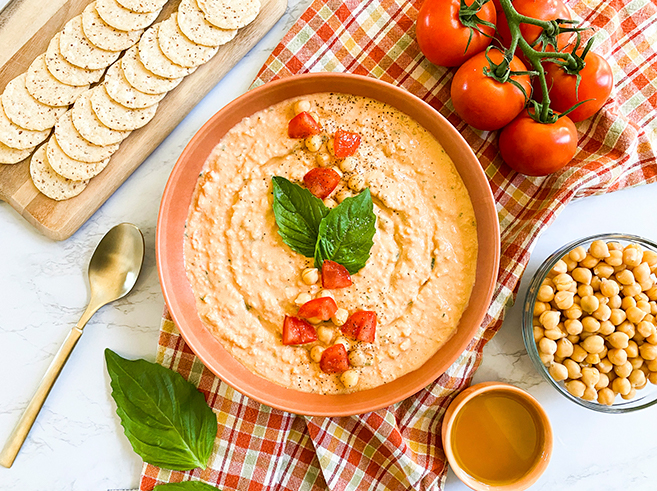One of the most powerful ways to improve your overall health, feel more energized, and prevent chronic illness is to make lifestyle changes. Science shows changing your nutrition is the most impactful way to live longer and reduce your risk of getting sick. There have been multiple studies done that show evidence supporting a plant-based diet contributing to prevention, control, and even reversal of many chronic illnesses. But what is a plant-based diet? Is it the same thing as being vegetarian or vegan? Or does a plant-based diet just mean that you make an effort to incorporate more veggies into your meals?
WHAT IS A PLANT-BASED DIET?

While some may use the terms ‘plant-based diet’ and ‘vegan’ interchangeably, it can be broadened to include all types of vegetarian or flexitarian diets. While there is no official definition, the main idea is to make plant-based foods the central part of your meals. Following a plant-based diet doesn’t mean that you need to completely give up meat or seafood, but rather cut down on the frequency you eat them.
Think of the term plant-based as an umbrella that covers a few specific diets. They come in all shapes and sizes, but they all have a common denominator: plenty of fresh, healthy veggies. You may have heard a lot of terminology surrounding the ways of eating under the plant-based diet umbrella and some of it can be confusing. Are you a vegetarian or a vegan? Or are you a pescatarian? A flexitarian? We break it down for you so that you can choose the best plant-based version that will work for your lifestyle:
- Vegan – a person that doesn’t eat any fish, seafood, meat, or poultry. They also do not consume or use any products (such as wool or leather) that come from an animal.
- Vegetarian – a person that includes eggs, dairy, and other animal products (such as honey) in their diets.
- Pescatarian – a person that includes eggs, dairy, and other animal products, plus fish and seafood, but no meat or poultry in their diets.
- Flexitarian – a person that includes all animal products, including fish, seafood, meat, and poultry in their diets, but makes a conscious effort to replace many meals with plant-based protein alternatives.
THE BENEFITS OF A PLANT-BASED DIET
Most people who adopt a plant-based diet, in whichever form they choose under that umbrella term, do it for the potential health benefits. There are many scientific studies published over the past decade or so that support quite a few claims regarding how this way of eating can improve, prevent and in some cases reverse chronic conditions. Here are some major ways that a plant-based diet can impact your quality of life:

- A plant-based diet can help lower your blood pressure.
- It can help keep your heart healthy – but only if you are choosing unprocessed or minimally processed plant-based foods.
- Making a change to a more plant-based diet can help prevent and even reverse Type 2 Diabetes.
- The risk of obesity decreases on a plant-based diet. Including more quality plant-based foods that are lower on the glycemic index, can prolong the feeling of fullness and can even help you lose weight.
- Multiple studies have shown that plant-based diets can help you live longer.
- The protective benefits of a plant-based diet, that come from antioxidants like lycopene, have shown promising results in reducing the risk of some cancers.
- A plant-based diet, full of fiber-rich plants, can help improve cholesterol levels.
- Having high blood pressure, obesity, diabetes, or heart disease can increase your risk of stroke. By following a plant-based diet, you reduce the risk for all these comorbid conditions.
- There is compelling research that is showing plant-based diets can help keep your brain strong. Polyphenols from fresh fruits and veggies, may help slow the progression of Alzheimer’s disease and help reverse cognitive decline.
START BY INCORPORATING MORE VEGETABLES
A sudden shift to a plant-based diet isn’t for everyone. But how do you make gradual changes to improve the nutritional composition of your diet? You can start by changing the way you think about meat and eating smaller amounts, or you can commit to cooking a meatless meal one night a week and then gradually increase that over time, but the best way is pretty simple – eat a lot of vegetables! Fill your plate with veggies at lunch and dinner, making sure that you include plenty of colors. The easiest step though, is to start replacing your snacks with quality, plant-based options.
Part of incorporating quality vegetables into your lifestyle change should include choosing organics whenever you can. We have many USDA Certified Organic veggies that are excellent for snacking on! Our Organic Juno® Bites Red Grape Tomatoes and Organic Sangria® Tomato Medley come in convenient, peel and reseal packaging. If you’re looking for a colorful, crunchy, feel-good snack that is packed with natural sweetness, try our Organic Aurora Bites Mini Sweet Peppers. For a refreshing, crisp, and hydrating snack, our Organic Mini Cucumbers are the perfect grab-and-go solution. On their own, or paired with your favorite plant-based dip, our organic snacking line makes the gradual shift into a new way of eating easy and delicious.
For those who have more time on their hands, or are looking to expand upon the simple veggies and dip type of snack, we have some tasty organic snack and appetizer recipes that can help!

- This Organic Tomato Basil Hummus recipe is the perfect smooth and creamy dip to serve as either an appetizer or snack! It is excellent paired with our Organic Aurora Bites or Organic Mini Cucumbers.
- These Cucumber Sushi Spirals take everything that is good about Greek salad, and wraps it up in an Organic Long English Cucumber sushi-style spiral.
- The perfect snack or appetizer for any occasion, these Organic Tomato Fritters are made with fresh Organic Roma Tomatoes, feta, and dill.
- You’ve heard of Hasselback potatoes, but what about Hasselback tomatoes? This Organic Hasselback Roma Caprese recipe is the most simple and delicious fresh snack or appetizer.
- For a refreshing snack or appetizer, try this Crostini with Organic Mini Cucumbers, Sugar Snap Peas & Ricotta recipe. The crisp Organic Mini Cucumbers complement the smooth texture of the ricotta. You can even choose a plant-based cheese to make it fit into your lifestyle.
START WITH SMALL STEPS
So many people take their health for granted and it’s not until sickness strikes that many question the way they’ve been eating and living. The price for not taking care of your health can be hefty however taking small steps toward change by simply incorporating more vegetables into your diet is a great start. Good health must begin with lifestyle changes and often that means taking responsibility for what you’re eating. A plant-based diet works to strengthen your body and improve your health. As with any lifestyle changes though, it is important to stay focused and be educated. Gradual changes, or baby steps, can make the shift easier and longer lasting. Before implementing any changes into your diet, it is important to see your doctor or a nutritionist to help set your foundation.
For more healthy snacking advice and tasty recipes, make sure to sign up for Pure Flavor’s® monthly newsletter.


